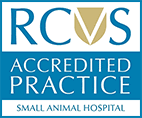Unlike domestic dogs and cats, a rabbit's teeth never stop growing and can grow nearly 2mm a week. Wild rabbits adapt for this growth by chewing daily on coarse grass and other vegetation that helps to wear down the crowns of their teeth. Pet rabbits are not typically offered access to the same type of vegetation and often consume dry pellets as the bulk of their diet.
Domestic rabbits also receive less sunlight when compared to wild rabbits. Sunlight helps with vitamin D production. The vitamin enables absorption of calcium from food for the proper development of the jaw and teeth. A lack of vitamin D can lead to teeth not growing and maturing correctly, leading to malocclusions and dental problems.
As a rabbit owner, you can keep an eye out for dental disease, as well as learn ways to keep your rabbit's teeth healthy throughout its life.
Dental disease in rabbits
The best way to diagnose dental disease in rabbits is to have your vet perform a thorough oral examination and take x-rays to see the tooth roots below the gum line. Through this procedure, your vet can discover a condition called malocclusion. When a rabbit's jaw is not aligned correctly due to malocclusion, their incisors become long, making it difficult for your rabbit to chew. Rabbit's teeth can be examined with them awake, but if there are problems, the only way to thoroughly examine the back molars is under anaesthetic.
As the tooth crowns grow longer inside the mouth, the top and bottom teeth hit as the rabbit chews, putting pressure on tooth roots below the gum line and creating gaps between the teeth and gums. Bacteria can become trapped in these gaps, leading to the infection of teeth roots and formation of jaw abscesses. It is also quite common for the incorrect movement of the jaw to cause sharp spikes on the teeth which can lacerate the tongue and cheeks.
Some other signs rabbit owners should look out for are salivation and a wet chin, decreased appetite, overgrowth of front teeth from lack of wear, or discharge from the eyes due to compression of the tear ducts from overgrown tooth roots.
How to care for your rabbit's teeth
Your rabbit's teeth should be checked regularly by your vet. Rabbit owners should also do the following:
- Monitor your rabbit for signs of dental disease, like selective appetite, salivation, eye discharge or jaw swelling
- Pet rabbits should have free access to hay or grass, making up 90% of their diet. The rest should be made up of pellets (not muesli) and fresh greens
- Provide your rabbit with access to direct sunlight
- Ask your vet about tooth trimming services.
We recommend that you inspect your rabbits' front teeth often. They should be creamy white, smooth except for a vertical line down the centre of the top ones, and end in a neat chisel-shaped bite. The back teeth are best inspected by a vet. By paying close attention to your rabbit's oral health, you will have a healthy and happy bunny.








